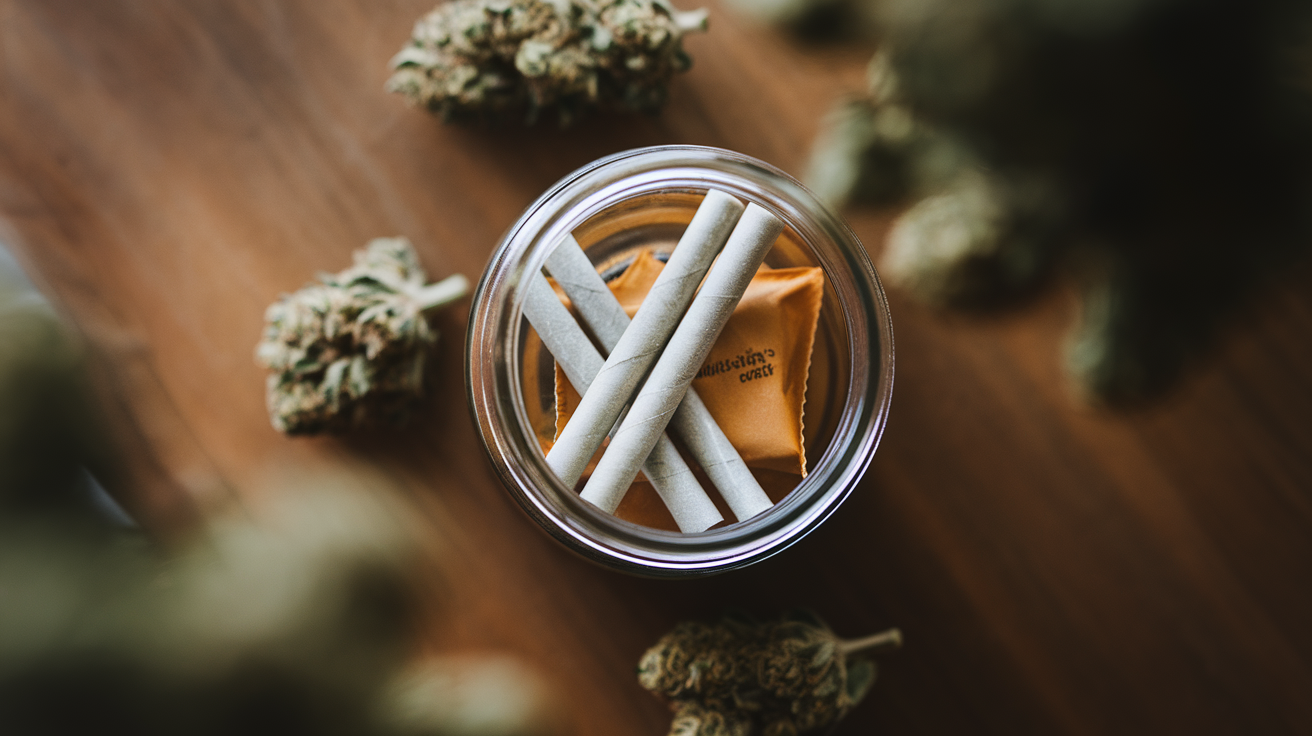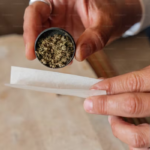The cannabis industry has witnessed a significant evolution, moving from artisanal, hand-rolled products to sophisticated, machine-made solutions. This shift is particularly evident in the rise of pre-rolled joints, which offer unparalleled convenience and consistency for consumers. As interest in natural and sustainable options grows, the “organic pre-rolled joint” has emerged as a distinct and rapidly expanding niche. This behind-the-scenes article explores the intricate, start-to-finish manufacturing process of machine-made pre-rolled joints, with a keen focus on how technology and organic principles converge to meet this burgeoning market demand.
Key Insights into Pre-Roll Production
- Precision Grinding and Material Selection: The journey begins with meticulously selected organic cannabis flower, which undergoes specialized grinding to preserve its delicate cannabinoids and terpenes, ensuring an optimal, even burn.
- Advanced Automation for Consistency: State-of-the-art machines meticulously fill, compact, and seal pre-rolled cones, delivering uniform weight, density, and an exceptional smoking experience that often rivals hand-rolled quality.
- Infusion and Quality Control: Many pre-rolls are infused with concentrates or terpenes for enhanced potency or flavor, all while undergoing rigorous quality checks to meet stringent regulatory and consumer standards.
The Genesis of an Organic Pre-Roll: Material Sourcing and Preparation
The foundation of any high-quality pre-rolled joint, especially an organic one, lies in the meticulous selection and preparation of its primary ingredient: the cannabis flower. For organic pre-rolls, this means sourcing cannabis grown without synthetic pesticides, herbicides, or fertilizers, often adhering to certified organic farming practices. This commitment to purity ensures a cleaner, more natural product, directly addressing the rising consumer demand for sustainable and chemical-free options.
Choosing the Right Organic Flower
Manufacturers prioritize high-quality cannabis flowers that have undergone rigorous lab testing for potency and contaminants. The choice between whole flower (whole buds) and trim/shake (smaller fragments) significantly impacts the final product’s flavor profile and smoking experience. For organic pre-rolls, the emphasis is always on cultivation methods that employ natural techniques like composting, crop rotation, and biological pest control, ensuring the integrity of the “organic” claim.
The Art of Grinding: Precision for an Even Burn
Once sourced, the organic cannabis flower undergoes a crucial grinding process. This is not simply about breaking down the buds but about achieving a consistent particle size that will burn evenly and smoothly. Unlike blenders or coffee grinders, which can generate excessive heat and friction, potentially degrading delicate cannabinoids and terpenes (essential for potency and flavor), specialized grinding equipment is employed. These machines carefully mill the flower, often aiming for varied particle sizes (e.g., between two and six millimeters) to mimic the characteristics of hand-ground flower, which contributes to a smoother, more even burn and reduces the need for frequent relighting.
Automated Precision: Filling and Compaction
The true marvel of machine-made pre-rolls lies in their automated filling and compaction capabilities. This stage ensures uniformity, consistency, and efficiency on a scale impossible through manual methods.
The Role of Pre-Rolled Cones
Machine-made pre-rolls commonly utilize pre-rolled cones, which are paper cones pre-shaped with a crutch (filter) already attached. These cones are often made from natural or organic papers, such as hemp or unbleached wood pulp, aligning with the organic ethos. They simplify the filling process, allowing machines to operate at high speeds.
Automated Filling and Compaction Techniques
Automated pre-roll machines excel at precisely dispensing and compacting the ground cannabis into each cone. The process typically involves:
Volumetric or Weight-Based Filling
Ground organic cannabis is loaded into a hopper and then precisely dispensed into each cone using either volumetric or weight-based systems. Many advanced machines incorporate automated weighing systems to ensure each pre-roll contains the exact desired amount of cannabis, meeting regulatory requirements and ensuring product consistency within 0.01 grams.
Compaction for Uniform Density
To achieve an even density throughout the joint, the cannabis is carefully packed or tamped down. Older methods, like vibration tables, rely on shaking cones to achieve even density. However, modern machines, such as the RollPros Blackbird, utilize proprietary radial compaction methods (e.g., TruRoll technology) that mimic the compaction of hand-rolled joints. This ensures uniform density and an even, consistent burn, significantly enhancing the smoking experience.
Twisting and Sealing
Once filled and compacted, the top of the pre-roll is precisely closed. This can involve twisting the end of the paper or creating a neat “Dutch Crown” fold, which offers a professional finish and helps preserve freshness. Some machines include specialized tools to facilitate the Dutch Crown fold for multiple joints simultaneously.
Video: RollPros’ Commercial Joint Rolling Machine in action. This video demonstrates advanced automated pre-roll production, showcasing how machines eliminate manual constraints and produce high-quality hemp or cannabis joints efficiently.
Infusion, Quality Control, and Packaging
Beyond filling and compaction, the manufacturing process incorporates steps for enhancing product appeal and ensuring safety and quality, particularly crucial for the premium organic market segment.
Infusion Techniques for Enhanced Experience
Some pre-rolls are “infused” to enhance flavor, aroma, or potency. Automated infusion machines streamline this process, ensuring consistent levels of infusion without extensive manual labor. Common infusion methods include:
Terpene Infusion
This involves coating the rolling paper with terpene extracts or adding terpene-infused oils to the ground cannabis before rolling. Terpenes are aromatic compounds found in cannabis that contribute to its distinctive scent and flavor profiles.
Concentrate Infusion
Cannabis flowers can be combined with various concentrates (e.g., oils, kief, wax) either inside the joint or by painting a thin layer on the outside. Automated machines can inject a precise amount of cannabis oil into each joint, with some capable of infusing one pre-roll every 4.5 seconds.
Rigorous Quality Control and Testing
Throughout the manufacturing process, stringent quality control measures are paramount, especially for organic products. This includes:
Consistency Monitoring
Automated systems continuously monitor for consistent compaction, weight, and density. Joints may be weighed individually to ensure precise dosing and adherence to regulatory standards (e.g., Health Canada standards). Some production lines use double verification systems to maintain product integrity.
Contamination Prevention
Facilities adhere to strict hygiene protocols, often operating in controlled environments with air filtration systems to minimize contamination risks, which is vital for organic products.
Visual Inspections
Even with automation, final visual inspections are performed to remove any defective or underfilled joints, upholding high brand standards.
Packaging for Preservation and Presentation
The final step involves packaging, which plays a critical role in preserving freshness, preventing damage, and communicating brand identity, particularly for organic certifications. Pre-rolls are typically placed in protective, often smell-proof, and child-resistant packaging, such as joint tubes or multi-pack boxes. For organic variants, manufacturers often prioritize eco-friendly packaging materials, such as recyclable tubes, to align with sustainable practices. Automated packaging machines are frequently integrated into the production line to handle this step efficiently, ensuring the product remains fresh and intact until it reaches the consumer.
Comparative Overview of Pre-Roll Manufacturing Aspects
To further illustrate the advancements and advantages of machine-made pre-rolls, especially in the organic sector, the following table summarizes key aspects and their implications.
| Aspect | Description | Impact on Organic Pre-Rolls |
| Cannabis Sourcing | Selection of high-quality cannabis flowers (whole buds vs. trim/shake). | For organic pre-rolls, strict adherence to cultivation without synthetic pesticides or fertilizers, often requiring certifications. |
| Grinding Process | Milling cannabis to a consistent particle size for even burn and cannabinoid preservation. | Specialized grinders minimize heat/friction to protect delicate organic terpenes and cannabinoids. |
| Cone Filling | Dispensing ground cannabis into pre-rolled cones, typically using automated systems. | Use of organic hemp or natural paper cones aligns with the organic product claim and consumer preference. |
| Compaction/Density | Ensuring uniform density for a smooth, even burn (e.g., radial compaction, vibration). | Advanced technologies like TruRoll mimic hand-rolled quality, ensuring consistent smoking experience for organic products. |
| Infusion | Adding terpenes or concentrates for enhanced flavor, aroma, or potency. | Automated precision ensures consistent infusion levels, even with organic or natural additives. |
| Quality Control | Monitoring weight, density, and overall product integrity. | Rigorous lab testing and automated checks ensure purity and absence of contaminants, upholding organic standards. |
| Packaging | Sealing and presenting pre-rolls in protective, often child-resistant, containers. | Prioritization of eco-friendly and recyclable packaging materials to align with organic and sustainable values. |
| Efficiency & Scalability | Ability to produce large quantities of consistent products rapidly. | Enables manufacturers to meet the increasing demand for organic pre-rolled joints in an untapped niche. |
Conclusion
The manufacturing of machine-made pre-rolled joints is a testament to the cannabis industry’s evolution towards efficiency, consistency, and quality. From the careful selection of organic cannabis flower to the precise automation of grinding, filling, compaction, and packaging, every step is meticulously engineered. The rising interest in organic products has further propelled manufacturers to adopt sustainable practices and specialized machinery that cater to this discerning market. By combining advanced technology with a commitment to natural ingredients, machine-made organic pre-rolls offer a convenient, consistent, and high-quality experience, establishing themselves as a significant and growing segment in the modern cannabis landscape.
Frequently Asked Questions (FAQs)
What makes a pre-rolled joint “organic”?
An “organic” pre-rolled joint means that the cannabis flower used has been cultivated using certified organic farming practices, without synthetic pesticides, fertilizers, or other harmful chemicals. The rolling papers may also be made from organic materials like hemp.
Are machine-made pre-rolls of lower quality than hand-rolled ones?
No, modern machine-made pre-rolls, especially those utilizing advanced compaction technologies like TruRoll, can deliver highly consistent density, weight, and burn quality, often matching or even surpassing hand-rolled joints in uniformity and overall experience.
How do manufacturers ensure consistency in machine-made pre-rolls?
Consistency is achieved through precise automated systems for grinding, weighing, and compaction. Machines control particle size, exact cannabis dosage, and uniform density, which are critical for an even and smooth burn.
Can pre-rolls be infused with other cannabis compounds?
Yes, pre-rolls can be infused with terpenes for enhanced flavor and aroma, or with various cannabis concentrates (like oils or kief) to increase potency. Automated infusion machines ensure precise and consistent application of these compounds.
What is the significance of the “Dutch Crown” fold in pre-rolls?
The “Dutch Crown” is a specific folding technique used to close the tip of a pre-rolled joint. It provides a neat, professional finish, helps seal in freshness, and often allows for a cleaner initial light compared to a simple twist.





